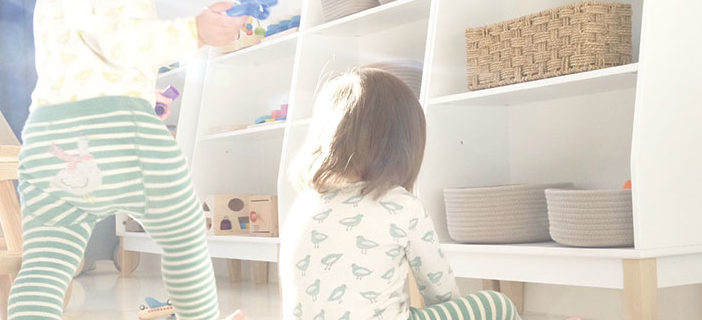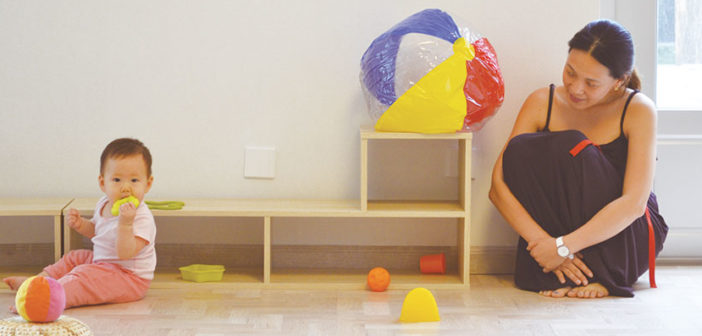“You are not allowed to put her into a sitting or standing position unless she does it by herself,” were the instructions given to me by another daycare teacher on the first day of a new job. The mother was raising her daughter the ‘RIE way.’ This was my first encounter with this approach which promotes free natural development, uninterrupted play, respects infants and babies by not invading their space, and treats even the youngest infant with the same dignity and respect, in speech and action, that you would give an adult.
The RIE (Resources for Infant Educarers) Educaring Approach is based on the work of Magda Gerber in the 1940’s, and having gained huge popularity in the West over the last decade, it is now quickly building momentum here in China. It appears this new generation of parents, raised under the single child policy, are desperate for an alternative to the ‘helicopter’ parenting style that is so common. Courses being offered to parents and educators are quickly sold out, and daycare centers that are guided by the Educaring approach are slowly beginning to pop up in Beijing.
The basis of this particular parenting approach is ‘respect’, where the infant is seen as a capable, competent individual. It might not sound like such a radical approach – to ‘respect’ a baby – but to see the Educaring approach in action, it becomes apparent that this is a radically different way of interacting with and raising our little ones, and encourages a very strong “sense of self”, even at a very young age.
The RIE (pronounced as “wry”) parenting approach has been adopted by Hollywood stars including Penelope Cruz, Tobey Maguire, and Helen Hunt, and the goal is to raise an authentic child who feels secure, autonomous, and connected (“they hear me, they see me, I am valued”). One of the key principles is to trust in the child’s competence; that he will learn what he is developmentally ready for.
“If you have trust in the child’s competency, in the fact they are explorers and initiators, if you believe that the infant is an individual in themselves, then you allow them to authentically develop, and it naturally unfolds,” says Jemina Villanueva-Vallee, an RIE intern in Beijing.

Instead of helping the infant or toddler with everything (apart from the main caregiving needs), caregivers ‘wait’ and observe to see what the child is trying to communicate and their needs. Parents and ‘educarers’ (educators who are trained in this approach) teach less and trust the child’s own ability to learn. This is the ‘hands off’ antidote to the ‘hovering’ parenting style. Instead of teaching the baby new skills, we admire and observe what the babies are actually doing. Ruby Xing, an RIE practicum student in Beijing, says that one of the main benefits to this style of parenting is that caregivers can ‘observe more, do less and enjoy most’, instead of feeling the pressure to entertain or educate their child.
For a society which tends to the view the child as something who needs help to learn to sit, to crawl, to stand, to walk, to eat, and to make decisions, RIE takes the opposite road, promoting the concept that the child is competent, able to learn and do exactly what they need to do at the right time for the child. Parents and caregivers give the child the freedom and space to develop independently – without the aid of walkers, jolly jumpers, bumbo seats or even cushions to prop them up. Instead, infants are placed on their back on the floor in a safe environment. They are not given ‘tummy time’, instead, they achieve ‘tummy time’ when they are strong enough to roll over themselves. The ‘milestones’ of sitting, walking and feeding also follow the same approach.
The Educaring Approach also gives infants and toddlers plenty of time for uninterrupted play and freedom to explore in a safe ‘yes’ environment. They do not have adult’s toy choices thrust upon them; in fact, caregivers do not even put toys into the baby’s hand. Instead, the infant or toddler will choose what they want to play with, how they play with it, and for how long, building a sense of independence and focused attention. RIE advocates say that an infant who has been raised having this sense of autonomy, and who is given the space to explore and try things, will grow into a self-confident and independent child.
While independent play is a key principle, it is the caregiving times that really build the intimate relationship between the caregiver and the baby. It is during the diaper changes, the bathing, the dressing, the feeding times, when cooperation and being present with the baby are the main focus. Infants are spoken to as though they were adults (no ‘baby talk’) and invited to be active participants in these activities, doing as much as they can.
Diapering is one of those respectful caregiving times. There’s no screwing up of noses and ‘ew stinky’ is not in the RIE phrasebook. Instead, caregivers wait for a break in the play and say discreetly “Please let me check your diaper now,” then “it’s time to change your diaper.” The process is slow and mindful and the caregiver comments on what they are doing and what is happening. Nothing is done without telling her first, which builds respect, language skills and is also a foundation to the concept of consent.
‘Hands off’ doesn’t mean there is no discipline. The RIE Educaring Approach to discipline is about providing limits and consistency. Children are ‘taught’ rather than told off, and there is an understanding that there is no such thing as a ‘bad kid,’ just a baby or a toddler with an unmet need. As an adult, it is our signal that the child needs help, whether physical or emotional. ‘Hands off’ also means giving infants and toddlers the opportunity to solve their own problems before jumping in to rescue. Infants and toddlers are often seen snatching toys off others, or touching other babies. Instead of solving the issue, an Educarer will observe, and step in if the children cannot seem to solve the issue alone, or if there is an issue of safety.
Babies and toddlers can do more than we think if we allow them to do it themselves, and give them the time and space to initiate their explorations. As children grow up, they need time to practice skills they’ll need for life, and the RIE approach to Educaring demonstrates that they don’t need to wait until they are three years old to start practicing, they can start from birth. And for us adults, RIE teaches us that we don’t need to wait until our child is an adult to show them true respect; we can begin on the day our child is born.

Photos: Courtesy of Jemina Villanueva-Valle
This article appeared on p42-43 of beijingkids May 2018 issue


